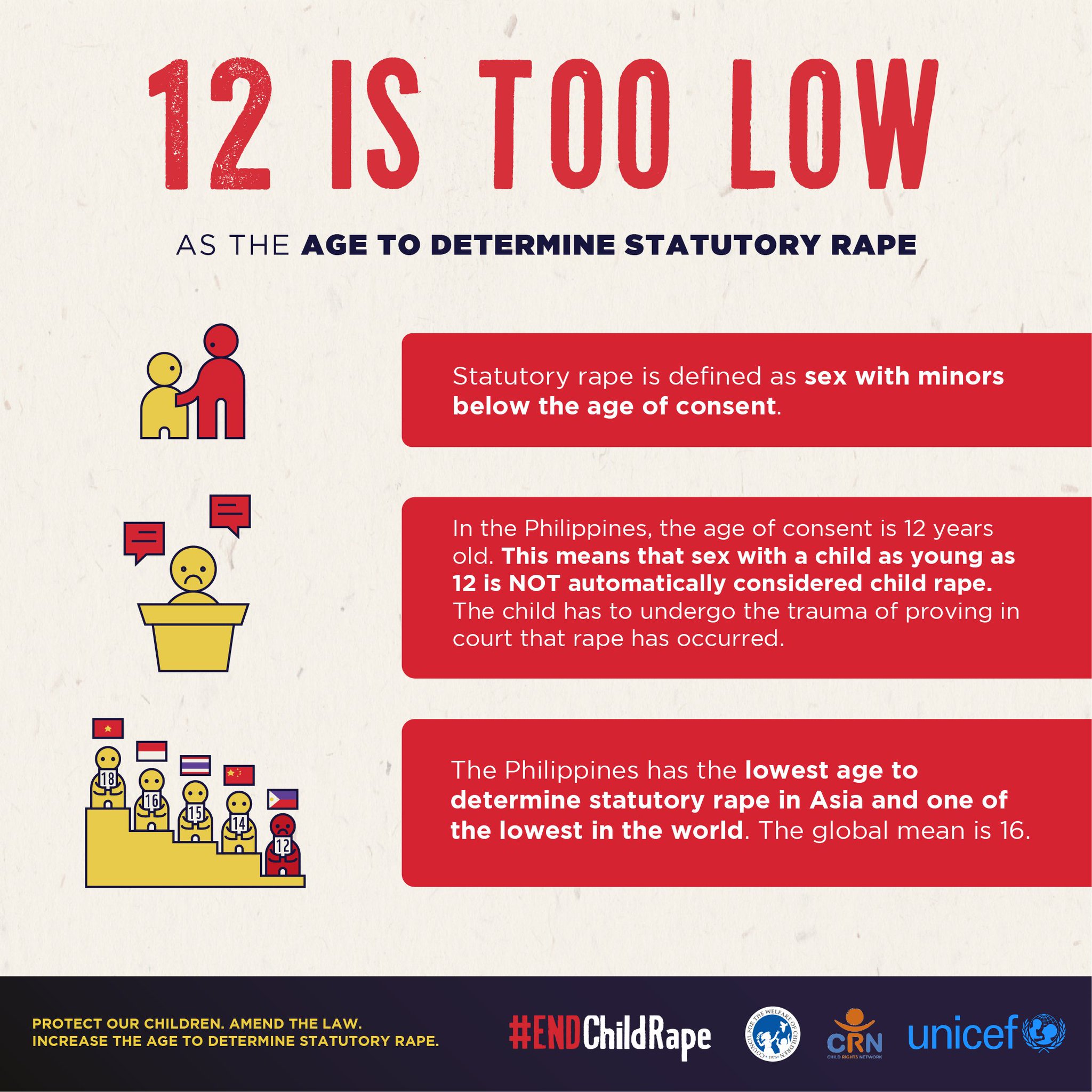The age of consent is 12
In a Twitter post on July 26, 2018, UNICEF Philippines said: "The Philippines has the lowest age of sexual consent in Asia and one of the lowest in the world. Tell our lawmakers to increase the age to determine statutory rape." The proposal is to raise the age of consent to 18.
It is true that rape is a heinous crime, like murder or homicide, and it is probably one of those which divide the nation regarding the issue on imposition of death penalty. This understandable since no man or woman deserves to be raped under any circumstance. Although there can be justification for death (e.g. self-defense) and theft (e.g. hunger and poverty), there is no excuse for rape.
HOWEVER, it is likewise the position of Project Jurisprudence that more clarification and discussion are needed regarding this issue on age of consent. The article written by Arias (2018) on Preen Inquirer with the title: "The PH age of consent is 12 years old and you should be alarmed" should be reviewed and reconsidered in light of the purpose of the law and the real-life consequences that the proposal may have which the author has possibly overlooked in her process of writing it.
Below is a nine-point argument to show that it is NOT entirely accurate to say that the age of consent should be raised to 18 years old.
 [1] Statutory rape is a crime and the difference between it and rape in its ordinary sense would be "consent" and the lack thereof.
[1] Statutory rape is a crime and the difference between it and rape in its ordinary sense would be "consent" and the lack thereof.[2] Having sex with a person who is younger than 12 years is AUTOMATICALLY punished as rape even if the offended party has given consent thereto.
[3] In short, the law presumes that a person 11 years and 364 days old, or younger, is not capable of giving consent. This is a conclusive presumption which cannot be overthrown even by the express admission by the offended party that she allowed herself to be engaged in sexual intercourse.
[4] On the other hand, a person who is 12 years of age or older is presumed to be capable of giving consent. The presumption is NOT conclusive; it is rebuttable. Therefore, if a person alleges and proves that the sexual intercourse or carnal knowledge was without her consent, the offender should be jailed for rape.
[5] Now that the rationale of the law in imposing an age of consent is clear, we must discuss the dangers of raising the age of consent to 18. It must be noted that Project Jurisprudence agrees that the current age of consent is TOO YOUNG but it disagrees with the proposal that it should be 18.
[6] Imagine an 11-year-old having sexual intercourse with a 12-year-old. Under the law, this is statutory rape because the former is below the age of consent.
[7] This time, imagine a 12-year-old having sexual intercourse with a 13-year-old. This is not statutory rape since both of those concerned are of age to decide whether to engage in such conduct.
[8] If the age of consent is raised to 18, teenagers below such age would be committing statutory rape even if they are sweethearts and even if there is consent. This is dangerous since it is not uncommon for childhood sweethearts to explore the world of lovemaking at a young age.
[9] Under the proposal, a 17-year-old who has sex with another 17-year-old would be liable for statutory rape. In fact, both of them would be liable since, as proposed, they would be below the age of consent.
Rape is a horrible crime and it should be punished. This is the reason why, although the age of consent is set at 12 under the Revised Penal Code, special penal laws provide for the protection of children. For example, seduction is a crime that disregards consent if the offended party is a minor. Under our child abuse laws (e.g. Republic Act No. 7610), the age gap between the parties is considered in determining whether a child is exploited or abused.
Again, Project Jurisprudence does not propose that the age of consent should be changed one way or another. However, the arguments above should be considered before any legislative move is made on this matter.
Arias (2018) ended her article, thus: "As citizens, it’s important that we speak out about this injustice toward children. UNICEF has an ongoing petition to end child rape to hopefully pressure the government to raise the age of consent. It’s also vital that we provide the tools to inform minors on sex, protection, and rape culture. Educational materials are readily available online, and people and groups like Now Open PH offer more knowledge on the topics mentioned.
"This is long overdue and we shouldn’t stop fighting for it. Let government officials know that they should support raising the age of consent in the country. Post and tag them on social media. Do what you can to spread awareness."
SOURCE: Arias, Jacqueline (2018). The PH age of consent is 12 years old and you should be alarmed. July 30, 2018. https://preen.inquirer.net/79776/ph-age-consent-12-years-old-alarmed
PHOTOS HOTLINKED FROM: https://pbs.twimg.com/media/DjBzWrDU0AAi0GR.jpg:large; https://i.kym-cdn.com/editorials/icons/original/000/000/275/cells-at-work-platelets.png



